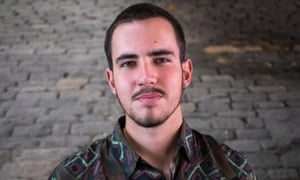The number of students seeking counselling at university has rocketed by 50% in the last five years, according to figures obtained by the Guardian.
As tens of thousands of teenagers leave their family homes this week and begin to arrive on campuses for freshers’ week, research shows that university counselling services are under increasing pressure as demand grows.
Heads of university counselling services say they are seeing more students arrive with existing psychological or mental health conditions. Some counselling services are under-resourced, and students are seeking help against a backdrop of mounting pressure to get the best possible degree, in order to secure a good job to pay off their debts from student loans.
“What used to happen was that in the first year people played hard,” said one head of counselling. “But now they are coming in already worried that they need to do well. They are far more vulnerable.”
The increasing number of international students is also a factor, with many under even greater pressure to succeed, coming from families who may have saved up for years to send one of their children to a UK university.
But though the overall trend is up, experts in the sector say part of the increase in demand is down to a new willingness among young people to ask for help. Many universities have also become far more proactive in reaching out to students.
The figures, obtained through a series of freedom of information requests to higher education (HE) institutions across the UK, indicate that at some universities young men, who are traditionally hard to reach, are increasingly using services as some of the taboo surrounding mental health dissipates.
For instance, at the University of Edinburgh, the number of male students approaching support services – including chaplaincy, disability and mental health services – between 2010-11 and 2014-15, more than doubled, with numbers up from 274 a year to 623.
Numbers of men approaching services also almost doubled at Glasgow University over the same period, thanks in part to male staff working on the counselling team, and a peer-to-peer support network which attracted a significant number of male students.
University College London was the only institution in the sample to include figures for transgender students seeking counselling. The figures were collected for the last three years and have increased slowly to 12 in 2015-16.
Catherine McAteer, the head of UCL’s student psychological services, said: “We have 39,000 students, soon to go up to over 40,000. There are 13 clinicians in my team. The reality is 13 people cannot meet that kind of demand.”
McAteer said her team had looked after 3,022 students in 2015-16, some of whom had lengthy waits before being seen, the longest being 15 weeks. “The problem is the longer they have to wait, the more likely it is that the problem will escalate,” she said.
When McAteer took over as head of the department in 2002, just 9% of students who accessed the service had existing psychological or mental health conditions. Last year it was 53%, who had previously been seen by therapists for a variety of issues including depression, anxiety and eating disorders.
The 50% increase in the number of students accessing counselling is based on figures comparing uptake of services in 2010-11 and 2014-15 provided to the Guardian by 37 higher education institutions, including many leading Russell Group universities such as Oxford, Durham, Liverpool and Sheffield.
In numerical terms, the number of students accessing counselling services in the Guardian sample rose from just under 25,000 five years ago to more than 37,000 in the 2014-15 academic year, a 50% rise.
This trend persists even when an overall increase in student enrolment is taken into account. Among those institutions which provided comparable enrolment and counselling figures, the proportion of students accessing these services rose by 47% in the same period.
“What’s happening is that students are now coming to university when previously they would not have come,” said McAteer. “When they come to a university like UCL or Oxford or Cambridge – one of the top 10 universities – the pressure is enormous.”
Swansea University, which recorded just 80 students seeking counselling in 2010-11, saw figures shoot up to more than 1,000 five years later, largely as a result of the university’s efforts to raise awareness among students and to destigmatise mental health issues.

Kevin Child, the head of student services at Swansea University, said: “The significant increase in demand for mental health support is a national trend, with all HE providers identifying the issue as a significant challenge.
“We have attracted students to our services who may traditionally have attempted to manage mental health issues for longer periods without coming forward, especially males. This has enabled us to make earlier interventions and provide more specific and effective support at an earlier stage.”
Ruth Caleb, the head of counselling services at Brunel University London (which was not part of the Guardian sample), and chair of the mental wellbeing in higher education working group, said there had been a 22% increase in demand for counselling at her university last year alone, with young men coming forward in greater numbers – 42.5% of Brunel students seeking counselling were male in 2015-16.
“Now that students are paying higher fees and are coming away with quite a lot of debt, there’s a lot more concern about getting a job and paying that debt off. They come in with the anxiety that they need to get a good degree,” said Caleb. “If the first few assignments don’t go brilliantly, it’s far more of a concern to them than it used to be.
“The other issue is the enormous growth in international students and widening participation students. It’s much harder to be a student if you are the first in your family or community to go to university.”
International students are often reluctant to join in social activities because they feel they should work all the time. Caleb cited “students who are coming from sometimes unstable societies – Syrian students Skyping their families and hearing the guns going off behind the Skype picture”.
Caleb said it was good that more young people felt able to come forward and ask for help, but resources for counselling services had not always grown sufficiently and in some cases had gone down in spite of the growth in demand. A report on Thursday by the Higher Education Policy Institute said that a number of universities needed to triple their spending on mental health to meet demand.
Some universities are prioritising mental health care. The University of York announced on Thursday it was investing £500,000 in mental healthcare provision across its campus after a six-month review, prompted by an increasing demand for services from students and disruptions to mental health provision in the city.
The university is planning to expand its in-house counselling service, with two new members of staff to ensure that those who need urgent appointments can be seen quickly. Its vice-chancellor, Prof Koen Lamberts, said: “As the number of students considering higher education grows, we must work hard to encourage openness between staff and students to talk about these issues in a supportive environment.”
The Nightline Association, which offers counselling services to roughly 18,000 students a year through its 39 branches, said in the last year alone calls to Nightline rose by 78% in Leicester, 46% in Sheffield, 40% in Durham and 35% in Leeds.
Katie Nicoll Baines, a volunteer at Nightline, said: “The rise is perhaps because people are becoming willing to use our services, and perhaps they just need them more because university is becoming such a competitive and trying environment for a lot of young people.”
Alan Percy, who is head of counselling at Oxford University and on the executive of the Heads of University Counselling Services, warned against “catastrophising” student mental health.
“A lot of these things are normal emotional responses to life challenges,” he said. “A lot of students are feeling overwhelmed by life and the pressures of life in terms of having to be perfect. A lot of them feel they’ve got to get everything right.”
But he added: “It’s not universities that are causing this. It’s a wider social problem.”
‘You know that you’re going to come out with around £50,000 of debt. I stress about that all the time’
Struggling to be heard over the din of excited freshers, a small group of students has gathered in Sheffield University’s students’ union to talk about mental health. The committee of the Mental Health Matters Society are not in the least surprised by new statistics showing university counselling services around the country to be under huge pressure.
They all say they love their university, describe it as “welcoming” and are sure it’s better than most at providing services but have joined the society, set up a decade ago, to be part of a student support network, and to campaign for more awareness and funding for mental health.
Joseph Bonnett, a final-year geography student and the society’s men’s health representative says he found help with his friends by talking about his problems and also with the society.

He says that though such societies cannot provide treatment or counselling, offer a support network outside the official structures for those suffering from mental health problems.
With £9,000-a-year tuition fees and a tough graduate jobs market, the group agree that modern student life involves more pressure. When the society’s president, Reena Staves, was managing the society’s various online accounts last year she was inundated by people needing help, with depression, anxiety and eating disorders being among the most common problems.

“I just really wanted to say to them: ‘I’ve been in a similar place,’ but I couldn’t because that would have been unprofessional, so I just had to point them in the direction of the various services available,” she says.
Gracie Marlow, a second-year English and philosophy student, says she is constantly stressed about her job prospects when she graduates. “You know that you’re going to come out with around £50,000 of debt. I stress about that all the time,” she says. “And you’re probably going to end up with a job that doesn’t pay much more than it would if you didn’t have a degree.”

A common issue raised is the pressure to have the stereotypical student experience, with all the heavy drinking and late nights that that entails. “I remember during the first week of uni there was a kind of intro tour and they told us this was going to be the best three years of our lives and that we were going to have the most amazing time,” says Lucy Baldwin, the society’s vice-president, who is in the final year of a zoology degree.
“My uni experience has not been the same as a lot of people’s and you think: ‘Have I wasted this? Should I have tried harder?’ And a lot of people can get in a rut thinking that their experience hasn’t been what it was supposed to be and feeling like everybody else around them is having the best time ever. I don’t think social media helps with that.”
The group acknowledges that the growing burden put on university mental health services is also partly the result of a greater willingness to talk about the issue. “[Society] is becoming more open, but if we can’t provide support for the people who now feel that they can speak up about [mental ill health], that’s a really difficult position to be in,” says Megan Myer, who is doing a master’s in English literature.
Myer argues that universities should be prioritising funding for mental health services above all else. “It’s great to have the infrastructure and the resources, but if you as a person don’t have the resources to get through university then there’s no point having the big expensive buildings,” she says. “People should be the priority.”
Louise Knowles, the head of the University Counselling Service, says the wellbeing of students and staff is paramount and that the service works hard to ensure its “free, confidential service is one our students have confidence in”.
“It is our work in this area that helped us become the first university counselling service – and one of only seven organisations nationally – to be awarded a new quality assurance accreditation badge through the Accreditation Programme for Psychological Therapy Services last year,” she says.
“Our accreditation recognises both the extremely short wait times – which have almost halved since 2011-12 – as well as our talented and clinically robust team who offer a varied range of treatments and interventions in a challenging environment.
“We are committed to continually improving the quality and standard of the service we deliver, balancing this against increasing numbers accessing our service and looking at new and innovative ways of working with students.”
- Additional reporting by Pamela Duncan and Sophia Schirmer.
University mental health services face strain as demand rises 50%
Hiç yorum yok:
Yorum Gönder